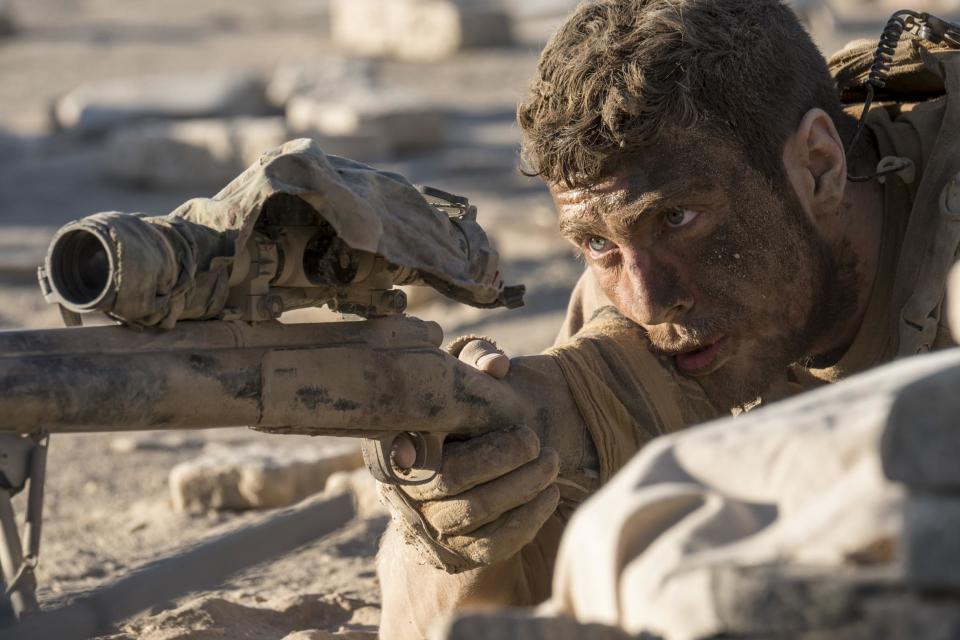The Wall, film review: This film could be used as an instrument of torture
It's not the first film with the name, and if Donald Trump honours his promise of a construction project spanning the United States’ southern border, it will not be the last. But however many movies called The Wall are released between now and Doomsday, be it two or two million, the one concerning us today will forever remain the most stupefyingly tedious.
If this dismal tale of a US soldier shot and then verbally tormented by a sniper in the Iraqi desert styles itself as a psychological thriller, the guys at trades descriptions will want a gander at that. There is very little psychology — and not the hint of a thrill.
The best to be said of it is not that it is brief. Technically it is, but as Christopher Nolan explores throughout his oeuvre, not least in Dunkirk, time is distorted by experience. The almost 90 minutes spent watching The Wall felt like four hours. Not any four hours. Four hours strapped into a dentist’s chair with no choice but to listen to Theresa May reciting one of Fidel Castro’s pithier speeches, while watching footage of a training session featuring the George Graham-era Arsenal squad practising the offside trap.
The best to be said about The Wall is that it has a certain homeopathic coherence. It is a movie about a kind of torture that could be used as an instrument of torture. Like waterboarding, it ought to qualify as “cruel and unusual punishment”. Unlike waterboarding, it might actually loosen tongues.
It would be mildly ironic if the good folk at Gitmo took this advice, because in so far as The Wall has a discernible political perspective, it is unsympathetic to the American cause. Set in 2007 with the Iraq War dribbling to its close, it poses the searingly unoriginal question of who is fighting for freedom — invaders or resistance? — and who are the real terrorists. Lacking the conviction to take a clear stance, it settles lazily for some sort of vague moral equivalence.
In what is effectively a two-hander, US army ranger Sergeant Isaac (Aaron Taylor-Johnson) is a mindless, potty-mouthed human drone, while Iraqi sniper Juba (Laith Nakli, heard playing an insipid verbal game of cat-and-mouse with him via a radio purloined from a previous victim but never seen) is cultivated and intelligent.
As Isaac crouches behind the wall, wounded by a bullet to the leg, broiling in the sun, his vocabulary runs the alphabetic gamut from F to F. To his bewilderment, as frankly to mine, Juba quotes him passages from Edgar Allan Poe’s The Raven.
The only other character is Isaac’s colleague Sergeant Matthews. Thankfully, given that he is played by pro wrestler John Cena with that trademark WWE growl, he has the good grace to be muted after a few minutes by the gunshot that leaves him exposed in the sand. Isaac, whose southern timbre hints at the usual story of the aimless school leaver recruited outside Walmart, sadly retains the power of speech. This exposes him as a moron with no curiosity as to why he is on yet another tour of duty in Iraq protecting oil pipelines.
The premise of a relationship developing between hunter and hunted has clear possibilities. Admittedly, given the unchanging beigeness of the setting and grinding dearth of visual variety, cinema is not the medium in which to develop them. This feels like a one-act stage play or radio drama that has inexplicably escaped its proper metier.
Yet despite the limitations imposed by a miserable budget that doesn’t extend to a score, you can almost imagine it working as a taut examination of the strange intimacy of lethal enmity, or a shifting power balance between predator and quarry.
But there’s none of that here. Isaac is too thick to engage with either Juba or whatever issues the film thinks it is raising. He don’t no need no education (he hasn’t heard of Poe). He don’t need no thought control (he never had a thought worth controlling). All in all, he’s just another brick in the crumbling wall of neo-imperialist hubris.
As for Juba, the revelation that he used to teach English hints at hackneyed staleness. Do we need crudely reminding that war creates odious paradoxes and does monstrous things to good people? At one time, al Qaeda’s number two was the top paediatrician in Cairo.
Taylor-Johnson is a good young British actor, but even a swiftly unretired Daniel Day-Lewis would struggle to mould a character anyone could care less about from such a drab script. And although Doug Liman’s direction of The Bourne Identity showed his ability to convey lightning-paced, raw physical excitement, the tale of an immobile man peering through a hole in a wall in the futile hope of spotting an invisible man hidden in rubble 200 yards away does not seem the ideal conduit for that talent.
Any attempt at emotional involvement is reserved for the closing moments, when Isaac finally reveals something intriguing about himself, moments before a twist you may see (or hear) coming literally a mile off.
So much too little, much too late. I’m as smugly self-righteous a bleeding-heart liberal as you could ever wish to avoid, and I’d have shot Isaac in the head after 10 minutes without a shred of guilt or regret.
As a chemical-free soporific, the film may have use for chronic insomniacs with allergies to narcotics. But its greatest potential value is as a cost-cutting repellent. If Trump built a 2,000- mile cinema screen stretching from California to Texas, and screened The Wall on it on an unending loop, not one Mexican would approach the border. Build it, Mr President, and they will not come.
Cert 15, 88 mins

 Yahoo News
Yahoo News 

